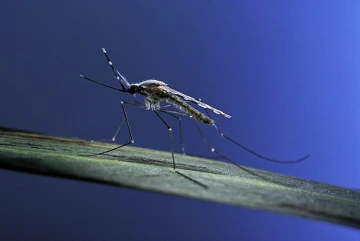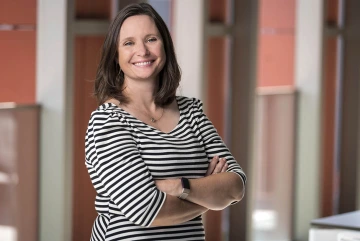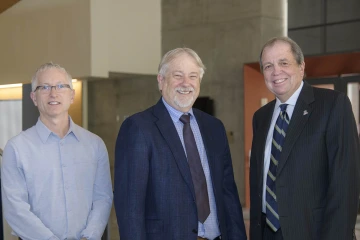A One Health Approach for Better Health Solutions
The One Health approach to research connects experts in human, animal and environmental health to improve health outcomes for all.
Malaria, a disease caused by the bite of a certain type of mosquito, is preventable and usually treatable. Yet, the World Health Organization estimated that in 2020, there were 241 million cases of malaria that resulted in 627,000 deaths.
Doctors can prescribe preventive and curative drugs, but they cannot stop the disease from spreading amongst the mosquito population and posing a risk to populations with limited access to health care.

Malaria is a zoonotic disease spread by the Anopheles mosquito. Controlling malaria requires a One Health approach that takes into account the ecology of mosquitoes, how mosquotoes interact with humans and the environmental conditions that contribute to the disease’s spread.
“To do something about malaria, you have to understand the ecology of the Anopheles mosquitoes, their interactions with humans, and the environmental conditions that contribute to the spread of the disease,” said Frank A. von Hippel, PhD, a One Health expert at the University of Arizona Health Sciences and a professor in the UArizona Mel and Enid Zuckerman College of Public Health. “This applies to thousands of diseases where expertise in human health, animal health and environmental health overlaps.”
A recent example is COVID-19. Like malaria, COVID-19 is a zoonic disease, meaning it can spread from an animal host to humans and from humans to animals. But unlike malaria, COVID-19 is contagious between humans.
“In order to understand both the current pandemic and to predict and prevent future pandemics, you have to understand the ecology of the system,” Dr. von Hippel said. “In the case of COVID-19, that includes the ecology of the bats that harbor the virus, how that virus ecologically can jump to humans and how it spreads.”

Frank von Hippel, PhD, is promoting a One Health approach to research by connecting UArizona Health Sciences experts with colleagues across the university to improve health outcomes for all.
Grasping each of these factors is too tall of a task for any one expert or single field of research. To fully understand the complexities and the interconnections among people, animals, plants and the environment, a more collaborative approach to research is needed.
To that end, UArizona Health Sciences is supporting a campus-wide One Health research initiative, led by Dr. von Hippel. By integrating expertise in human, animal and environmental health, One Health aims to improve health outcomes, better respond to public health challenges, assure safe and healthy food and water, and protect global health security.
The ultimate One Health topic
A trip to a grocery store or local farmer’s market has much larger health implications than one might realize, including on the availability of a healthy diet. That is because our food system is highly complex, according to Kerry Cooper, PhD, assistant professor in the School of Animal and Comparative Biomedical Sciences at the UArizona College of Agriculture and Life Sciences and BIO5 Institute member.

In lettuce fields, animal manure can contaminate the soil or irrigation water with E. coli, which can pose a serious risk to human health. E. coli outbreaks in Romaine lettuce are a recent example of why Kerry Cooper, PhD, believes food safety is the ultimate One Health topic.
The produce we consume is typically grown on farms, where contaminants in the soil and other environmental conditions can threaten the safety of our food, Dr. Cooper explained. The water used to grow the plants can pose its own threats, too. Local water sources are critical not only to growing crops, but also to the survival of wildlife like birds, insects and other animals that can also including livestock.
Every aspect of the cycle can be further disrupted by human-caused changes to the environment – pollution, for example – that affect the food supply.
“There is a lot that goes into food safety most people don’t think about,” Dr. Cooper said. “That’s why I consider food safety to be the ultimate One Health topic.”
A more complete story
Kristen Pogreba-Brown PhD, MPH, associate professor in the Zuckerman College of Public Health, has been pushing the One Health approach for several years. As an infectious disease epidemiologist, she sees One Health as essential to solving “wicked problems” like pandemics, antibiotic resistance and water security.

Kristen Pogreba-Brown PhD, MPH, says she began discussing the One Health approach with campus colleagues as early as 2014.
“These are really big problems that we aren’t going to solve with a single entity or single discipline,” said Dr. Pogreba-Brown, who teaches an applied One Health course through the Zuckerman College of Public Health. “We have been working at a grassroots level for years, but now we are starting to look more seriously at collaborations and opportunities to address these problems together.”
Drs. Brown and Cooper have been combining their shared expertise in foodborne illness for several years.
“Kerry says he doesn’t want to talk to people and survey them for a living, and I don’t want to collect fecal samples,” Dr. Pogreba-Brown said. “That’s one of the things that makes us good collaborators.”
Dr. Pogreba-Brown’s research can collect information from people, such as what someone ate before they got sick, while Dr. Cooper’s research can confirm whether the bacteria that caused the illness comes from the source reported by the patient.
“She’s the epidemiologist, I’m the microbiologist,” Dr. Cooper said. “We can combine her data and my data to get a much more complete story.”
A holistic approach
At the inaugural UArizona Health Sciences One Health Symposium in May, Kate Worthing, BVSc, PhD, outlined what a veterinarian can bring to a One Health team.
“The idea is to break down research silos.”
Frank A. von Hippel, PhD
“A veterinarian is thinking about the humans who are associated with an animal and the environment that is shared by the humans and the animal,” said Dr. Worthing, assistant professor of practice in the UArizona College of Veterinary Medicine. “It is that lateral thinking and holistic approach that makes veterinarians really great team members.”
Drs. Worthing, Cooper and Pogreba-Brown are laying the foundation for more solidified collaborations, particularly in the area of food safety and foodborne diseases that affect animals and people.
Dr. Worthing is also interested in working with Dr. Pogreba-Brown and other public health researchers to study One Health approaches to animal shelters. They hypothesize that animal shelters could serve as a useful model for infection control in human long-term care facilities.
New research opportunities

(From left) Frank A. von Hippel, PhD, was joined by Daniel Derksen, MD, the UArizona Health Sciences associate vice president for health equity, outreach & interprofessional activities, and Michael D. Dake, MD, the senior vice president for Health Sciences, in welcoming researchers from across campus to the One Health Symposium in May.
Attendees at the One Health Symposium also listened to Dr. Pogreba-Brown present about research she and her graduate students are conducting on the impact of the pandemic on conditions at the Pima Animal Care Center (PACC). Her class has been conducting needs assessments and other projects with PACC through the implementation of a One Health model.
“Everyone wants to make evidenced-based decisions,” said Dr. Pogreba-Brown, who is a member of the BIO5 Institute. “But you have to have the evidence first.”
If researchers can demonstrate that One Health approaches to animal care are successful, it could attract federal funding to initiate studies and implement new policies in human health care.
“The idea is to break down research silos,” Dr. von Hippel said. “We have a lot of research groups across campus doing one or two aspects of One Health, but typically not all three. The expertise is here, we just need to bring everyone together.”
The next UArizona One Health Symposium will take place on Sept. 28, and will feature Linda Birnbaum, PhD, former Director of the National Institute of Environmental Health Sciences and the National Toxicology Program, as keynote speaker.
Contact
Blair Willis
520-626-2101
bmw23@arizona.edu

